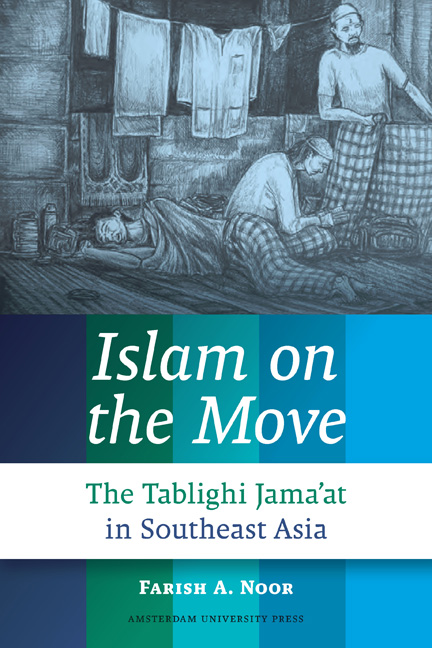Book contents
- Frontmatter
- Dedication
- Contents
- A Note on Proper Names and the Spelling Used in This Book
- Glossary
- Introduction: Brother Bismillah and My Introduction to the Tablighi Jama’at
- I At Home Across the Sea: The Arrival of the Tablighi Jama’at and Its Spread Across Southeast Asia
- II Learning to Be: The Foundational Literature of the Tablighi Jama’at and Its Role in Defining the Movement
- III Learning on the March: The Portable, Reader-friendly Literature of the Tablighi Jama’at and Its Role in the Self-identification and Reproduction of the Movement
- IV The Stories We Tell: The Conversion Narratives of the Tablighi Jama’at and the Internalisation of Tablighi Identity
- V Learning to Be Tablighi: The Rule-governed World of the Tablighi and the Disciplining of the Self
- VI How We Look and What We Are: The Tablighi Jama’at Framed in the Eyes of Others
- VII Finally, a Summing Up: The Tablighi Jama’at as the Complex Thing That It Is
- Notes
- Bibliography
- Index
III - Learning on the March: The Portable, Reader-friendly Literature of the Tablighi Jama’at and Its Role in the Self-identification and Reproduction of the Movement
Published online by Cambridge University Press: 14 January 2021
- Frontmatter
- Dedication
- Contents
- A Note on Proper Names and the Spelling Used in This Book
- Glossary
- Introduction: Brother Bismillah and My Introduction to the Tablighi Jama’at
- I At Home Across the Sea: The Arrival of the Tablighi Jama’at and Its Spread Across Southeast Asia
- II Learning to Be: The Foundational Literature of the Tablighi Jama’at and Its Role in Defining the Movement
- III Learning on the March: The Portable, Reader-friendly Literature of the Tablighi Jama’at and Its Role in the Self-identification and Reproduction of the Movement
- IV The Stories We Tell: The Conversion Narratives of the Tablighi Jama’at and the Internalisation of Tablighi Identity
- V Learning to Be Tablighi: The Rule-governed World of the Tablighi and the Disciplining of the Self
- VI How We Look and What We Are: The Tablighi Jama’at Framed in the Eyes of Others
- VII Finally, a Summing Up: The Tablighi Jama’at as the Complex Thing That It Is
- Notes
- Bibliography
- Index
Summary
Like a vast shapeless rock worn to a rounded boulder by countless drops of water, experience was shaped by millions of printed words into a ‘concept’ on a printed page, and in due course, into a model.
Benedict AndersonFrom the hefty, we now move on to the lightweight. I would like to focus on the range of portable, pocket-sized reading material that has been produced by and for the members of the Tablighi Jama’at and for those whom they wish to convert to their path as well. The Tablighis in fact produce a steady stream of what can be described as reader-friendly booklets and pamphlets, which are widely consumed, distributed and shared among their members. This is particularly true in the case of Indonesia where a number of Tablighi publishing companies have emerged (Pustaka Assajadah, Pustaka Ramadan, Pustaka Nabawi, etc.) that seem to specialise in reading material for the Tablighis themselves. Similar presses have also appeared in other parts of Southeast Asia, including Malaysia and Thailand.
Before discussing the common general features of these pamphlets in terms of their style, form, themes, etc., I will offer a sampling of some of the more popular ones that have made their rounds over the years and which I came across in the course of my field research.
Of course, much of Tablighi literature is concerned with the primary textual sources that outline the form and purpose of the movement itself. The works of the Tablighi's founder-leaders Maulana Muhammad Ilyas, Muhammad Zakaria and Muhammad Yusuf Kandhalawi loom large as the first major texts to be studied and, as I have shown earlier, have been reproduced in their most complete form for educational purposes.
There is, however, also another type of Tablighi literature that comes in the form of small, pocket-sized pamphlets where works like the Fadhail a’mal, the Hayat al-Shahabat, and the Muntakhab a-Hadits of Maulana Muhammad Zakaria have been extensively edited and reduced for quick and easy reading, particularly by new initiates to the movement. In the course of my fieldwork I discovered some very succinct renditions of these texts, the briefest coming in the form of a single page of A4 paper that was folded twice and stapled, which was the shortest rendition of Muhammad Ilyas Kandhalawi's elaboration of the six fundamental principles of the Tablighi.
- Type
- Chapter
- Information
- Islam on the MoveThe Tablighi Jama'at in Southeast Asia, pp. 89 - 114Publisher: Amsterdam University PressPrint publication year: 2013



